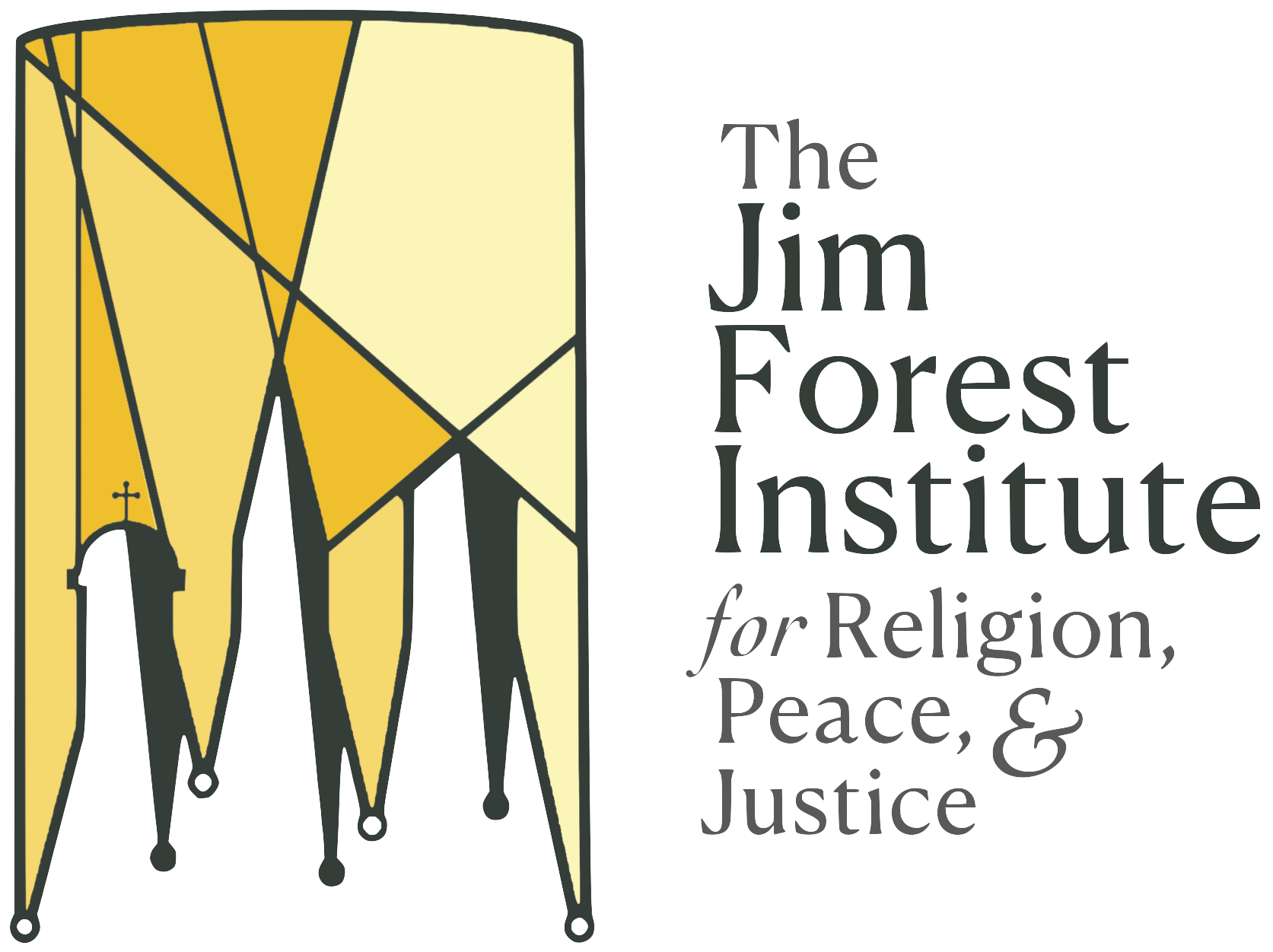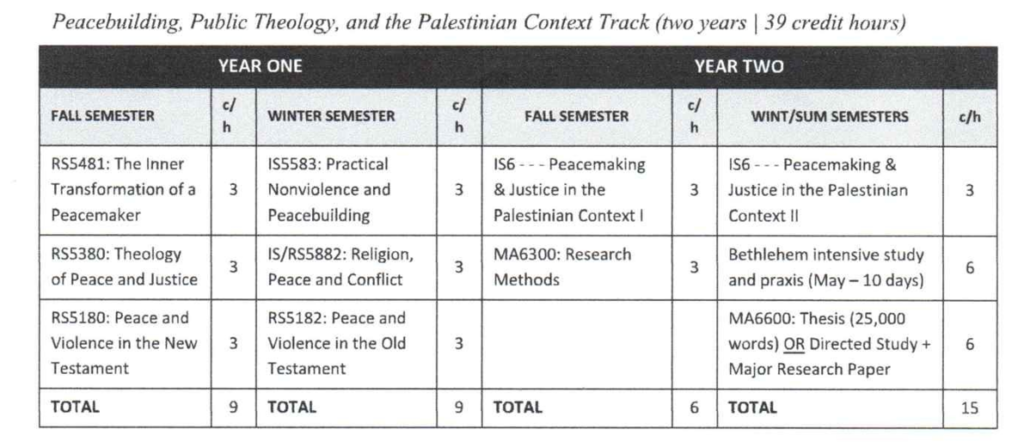

MA in Peace and Justice in the Palestinian Context
The Inner Transformation of a Peacemaker — The inner transformation of a peacemaker gives the interior foundation for being a genuine rather than contrived and inauthentic agent of peace. This course will explore issues of ego, pride, anger, a sense of failure, and other impulses that can be transformed into patience, self-control, compassion, and other virtues—especially humility to overcome ‘epistemological hubris’—in circumstances ranging from violent forms of communication to the chaos and trauma of violent conflict. We will therefore explore historical ascetic, spiritual, and contemplative disciplines and exercises that induce our transformation as peacemakers and are directly transferable into real-life situations.
Theology of Peace and Justice — This course will explore a variety of perspectives on peace theology and justice by drawing on examples and lessons from the Scriptures, Christian history, and real-life circumstances. We will explore themes such as pacifism and nonviolence, ‘just’ peacemaking vs. just war, love of enemies, reconciliation, and inner peace, among others as they appear in various theological categories. We will also look at peace through the lens of restorative rather than retributive justice, how peace and justice relate to one another, and its application in issues involving ethnicity, indigeneity, gender, sexual orientation, class, poverty, ecology, and food justice.
Peace and Violence in the New Testament — This course will focus on peace as a major New Testament theme by examining the life, teachings, and cruciform enthronement of Christ as the Prince of Peace; exploring the content and implications of the gospel of peace (vis-à-vis atonement and reconciliation); and interpreting the Book of Revelation through a Lamb-centered cipher. While the gospels will figure prominently, the scope of this course includes the entire New Testament canon, including Acts of the Apostles, Pauline epistles, pastoral epistles, and the Book of Revelation.
Peacemaking & Justice in the Palestinian Context I — This course will provide important tools for peacemakers in contexts of conflict throughout the world. It is an excellent introduction to the process of peacemaking and achieving social justice informed by the teachings of Jesus on peace, forgiveness, and reconciliation. Furthermore this course will provide and introduction for students to the Palestinian/Israeli conflict and the obstacles and prospects for peace. Topics that will be explored include: basic concepts of the causes of conflict and violence in societies, the prevention, mitigation, and resolution of conflict, and the building of sustainable peace; Palestinian Christian theologies of peace; interfaith reflections on peace and justice and the problem of religious extremism; non-violence and injustice and peacemaking and resilience; the practice of sulha in Arab societies and how it relates to other models of reconciliation; examples of peacemaking and social justice in conflict zones including South Africa, and Myanmar; the possibilities for peace and justice for all the people of Palestine and Israel; and the interaction of religion and politics.
Practical Nonviolence and Peacebuilding — This course introduces students to the field of peace and conflict studies by exploring the prevention, analysis, and resolution of conflict and the many innovative and creative ways to build peace in fragmented societies. The course focuses on the components, theoretical paradigms, and methods of peacebuilding “from the ground up,” although attention will also be given to official high-level peace processes and negotiations, with an emphasis on how ground-level and high-level activities complement or otherwise impact each other.
Religion, Peace and Conflict — By drawing on sacred texts and experiences of the major world religions and the available studies on religious violence and peace, this course examines how religion can intersect with other political, economic, social and cultural forces to justify violent conflict and explores the many ways in which interfaith peacebuilders may appeal to religious values, teachings, rituals, and myths as resources for interreligious peacebuilding. This course also explores components and strategies of peacebuilding that are best suited to transforming sectarian conflict.
Peace and Violence in the Old Testament — This course will focus on peace and violence as Old Testament themes. It will examine and try to make sense of the apparent violence of God as recorded in the text, as well as the supposedly divine commands for human violence. We will further unpack the prophetic response to this violence, including the prophecies of the Prince of Peace and kingdom of peace. And we will examine how Christ, the apostles, and the early church responded to these Old Testament texts in a way that’s more sophisticated and mature than some of the rigid literalist approaches.
Peacemaking & Justice in the Palestinian Context II — Building upon IS5 Peacemaking & Justice in the Palestinian Context I, this course will provide further introduction to peacemaking contexts of conflict throughout the world. It further explores the process of peacemaking and achieving social justice informed by the teachings of Jesus on peace, forgiveness, and reconciliation. Furthermore this course will provide an introduction for students to the Palestinian/Israeli conflict and the prospects for peace. Other topics that will be explored include: practical steps in resolving conflicts; stages in interfaith reconciliation; international law, human rights and peace and justice; analysis of western and Palestinian Christian and responses to the Palestinian/Israeli conflict; the importance of including marginalized voices and peacemaking; women in peacemaking; gender and peacemaking; spirituality and the peacemaker; and analysis of peace initiatives in Israel and Palestine.
Research Methods I — This course is a 1-credit hour introduction on how to write a research paper, from conducting research to fine-tuning the final draft.
Research Methods II — This research course is a 2-credit hour prerequisite that will give students the tools for writing their M.A. in Peace Studies academic thesis.
Distance Directed Study (Special Topic) — This is directed study on a subject related to the student’s proposed thesis topic, and consists mainly of a number of relevant readings, written assignments, and discussions with the supervisor.
Bethlehem Intensive Residency (two weeks in the last two weeks of May) — The purpose of the two-week residential Summer (May) Intensive in Bethlehem is to provide students a first-hand experience of the challenges of peacemaking and of pursuing justice in the context of the Israeli/Palestinian conflict. The intensive will help students bridge the divide between the theory they have learned in the semester-length courses and actual peacemaking on the ground. Most of the ten days of the intensive are structured around a morning time for spiritual reflection, several hours of lecture and/or field trip, followed by a debriefing about the field trip. Students will have scheduled conversations with Christian, Muslim, and Jewish leaders, peacemakers, and organizations. Students are free to explore on the weekend.
Research Thesis — A thesis of 20,000 words (with some allowance plus or minus) on a topic related to peace studies. The thesis may be guided by professor either at SSU or the BIPJ.
Field Study — (Masters of Peace and Justice) The fieldwork course gives peace & justice students an opportunity to participate in efforts directed at addressing issues related to peace and justice from a variety of angles.
Capstone Project — (Masters of Peace and Justice) The capstone project (approximately 40 pages, double-spaced) involves a practical initiative or strategy that is designed and implemented under the supervision of a mentor and then described in written form. It is meant to be professional or practical in nature and must be accompanied by a 10- to 15-page theoretical defense that is academic in nature.

Note :* Winter Semester is the same as Spring Semester
The tuition for St. Stephen’s University courses is $1,180 Canadian dollars (CAD) per 3-credit hour course, or about $394 CAD/credit hour.
($1,180 CAD is about $930 USD, or about $310 USD/credit hour. All students will, however, need to pay St. Stephen’s in CAD at our CAD rate.)
The tuition for Bethlehem Bible College courses is $495.00 (USD) per 3-credit hour course, or about $165 USD/credit hour.
The final project – either the thesis or the reading course and research paper can be based either at St. Stephen’s University or Bethlehem Bible College. As the tuition per credit is different in each institution, the total cost of the MA depends on in which institution the final project is located.
The total cost of the MA in Peace and Justice: Peacebuilding, Public Theology in the Palestinian Context is $10,110 (US dollars) or $13,690 (Canadian dollars).
Admission to the Master of Arts in Peace Studies operates under the principle that it is better to accept our graduate students on a case-by-case basis rather than setting inflexible entrance standards. This means that in addition to a prospective student’s GPA and grades from their undergraduate degree, the Admissions Committee takes into consideration experience, drive and motivation, maturity level, reasons for completing the degree program, and many other intangible qualities.
That being said, we normally require an undergraduate degree from an accredited university in a related discipline (broadly defined) that gives the prospective student the tools to complete our coursework and flourish in our vibrant and growing learning community.
Prospective students therefore have a better chance of getting accepted into our program if they meet the following standards:
- Undergraduate degree from an accredited university
- Transcripts that show a minimum 3.0 GPA (B), with a 3.3 GPA (B+) in the last two years of the major
- Where English is not the student’s first language, demonstrated proficiency in English by scoring 550 on a paper-based TOEFL, 86 on an internet-based TOEFL, or 6.5 on an IELTS exam. Alternate language proficiency testing may be accepted based on demonstrated equivalency.
However, we welcome all inquiries and applicants from anyone interested in the Master of Arts in Peace Studies degree program.
